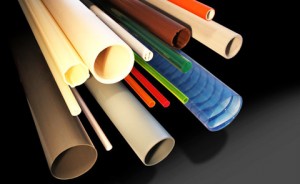
Manufacturing plastic tubes: from extrusion to customised finishing
At ABI Profils, every plastic tube is developed to measure. No catalogue, no standardised products — just precise, adaptable industrial know-how tailored to each customer’s technical requirements. This article gives a concrete overview of the different stages involved in manufacturing an extruded plastic tube, from choosing the right material to the available finishing options.
Specialising in flexible and rigid plastic tubes
For over 50 years, we’ve been designing and manufacturing plastic tubes for a wide range of industrial applications. Depending on the project’s technical requirements, we produce both rigid PVC tubes and flexible PE or PP tubes.
We work with a wide range of diameters, wall thicknesses, colours, and mechanical or chemical properties, always starting from a precise set of technical specifications.
Our equipment allows us to produce technical plastic tubes in HDPE, PP, rigid or flexible PVC, PS, ABS, and other specific formulations. Whether transparent, heat-resistant, or food-grade, each tube is custom-made to meet the intended application.
Discover all our plastic tubes here.
Plastic extrusion at the heart of the process
The manufacturing of a plastic tube begins with the extrusion phase. The raw material is heated and homogenised inside a screw extruder, then pushed through a custom-made die. The extruded tube is continuously formed as it leaves the tool.
At ABI, extrusion can be single-screw or twin-screw, depending on production requirements. We also offer coextrusion, which allows us to combine several materials to create multi-layer tubes. This process is ideal when complementary properties are needed: mechanical strength, flexibility, surface appearance, or chemical compatibility.
Find out more about plastic extrusion and coextrusion here.
Material selection and project-specific adaptation
The choice of plastic material depends on your project’s constraints: temperature, pressure, flexibility, food compatibility, UV resistance, etc.
Our technical team helps select the most suitable polymer, whether that’s polyethylene, polypropylene, or a more specialised formulation.
Whenever possible, we can also use recycled materials to meet eco-responsibility targets.
A fully customised production – no catalogue
Unlike general manufacturers, ABI does not offer a standard catalogue. Every flexible or rigid plastic tube is developed for a specific application.
We already have hundreds of existing tools, which allows us to respond quickly to many different needs. If no suitable tool exists, we design and manufacture a new custom tool in our workshop to ensure a perfect fit for your project.
Tailor-made finishes: in-line or post-extrusion
At ABI Profils, plastic tubes can be equipped with finishing options either in-line during extrusion or post-extrusion in our integrated workshop.
In-line finishes
Some operations are integrated directly into the production process to reduce steps and optimise lead times:
-
Drilling and punching
-
Inkjet marking (identification, numbering, customer codes)
-
Application of double-sided, protective or repositionable adhesives (wide range available through a partnership with TESA)
-
Application of magnets for specific uses
-
…and more
Post-extrusion finishes (integrated workshop)
When finishing cannot be done in-line, our post-extrusion workshop allows us to perform additional bespoke operations, such as:
-
Tulip shaping (controlled heating and shaping of tube ends)
-
Mechanical machining (milling, complex drilling)
-
Internal or external threading (screwing or tapping)
-
Sub-assembly operations
-
Stapling or fixing of complementary parts
This dual capability — in-line and post-extrusion — enables us to offer a very wide range of finishes, with maximum flexibility and full traceability.
A structured project process with a Product Development Sheet (PDS)
For every custom plastic tube project, we use a Product Development Sheet (PDS) — a document that structures communication between your company and our technical teams.
It includes all functional, aesthetic, and industrial requirements, and frames the design, prototyping, validation, and production launch phases.
This approach ensures rigorous support and full transparency at every stage of the project.
Recognised expertise across Europe
Our extruded plastic tubes are used in many sectors: automotive, construction, medical and paramedical, logistics, POS display, sports, aerospace, and more.
Each solution is the result of close technical collaboration between ABI’s teams and the client.
Thanks to our presence on both national and international markets, we can meet local requirements with tailored solutions.
Have a plastic tube project?
Custom extruded plastic tubes are a reliable, durable and precise technical solution for industrial applications.
At ABI Profils, we manufacture rigid or flexible plastic tubes in HDPE, PP, PVC, and other technical materials, according to your specifications. Each tube is designed to meet a specific application: food-grade, heat resistance, transparency, or mechanical and chemical constraints.
Our team supports you from design to finishing, with a fully structured project process and 100% custom production.
📞 Contact us via the online form or by phone on +33 (0)4 71 61 29 99 to get your custom plastic tube project started.
FAQ – Common questions about plastic tube manufacturing
Which material should I choose for a custom plastic tube?
The right material depends on your application’s specific requirements: temperature, pressure, chemical resistance, food or UV standards.
The most common polymers are HDPE, PP, rigid or flexible PVC, as well as specific formulations depending on the project.
At ABI Profils, we help you select the polymer best suited to your needs.
Why use coextrusion to manufacture a plastic tube?
Plastic coextrusion allows several materials to be combined in a single tube to give it different mechanical, chemical, or aesthetic properties.
It’s ideal for meeting complex technical requirements — for example, creating a tube that’s both rigid and flexible.
What’s the difference between single-screw and twin-screw extrusion?
-
Single-screw extrusion uses one screw to melt and transport the plastic material.
-
Twin-screw extrusion uses two intermeshing screws, providing better mixing, more efficient degassing, and excellent homogenisation.
Single-screw extrusion is suited to common polymers like PVC, PE or PP and is ideal for producing standard tubes efficiently and with great repeatability.
Twin-screw extrusion is used when a high level of material homogeneity is required — for example, for technical formulations, multi-layer tubes, or filled compounds. It guarantees consistent quality, even with materials that are difficult to process.
Can an extruded plastic tube be customised with specific finishes?
Yes — customisation is possible at several stages:
-
In-line during extrusion: drilling, punching, inkjet marking (traceability, logos, numbering), application of technical adhesives (double-sided, protective films, TESA range), or integration of magnets.
-
Post-extrusion in our integrated workshop: tulip shaping, threading, special cutting, complex machining, or assembly.
Thanks to our integrated workshop, these operations are carried out without subcontracting, ensuring maximum flexibility, faster lead times, and full traceability for every production batch.
Back to news home page


 Français
Français Česky
Česky Deutsch
Deutsch Slovenský
Slovenský Belgisch-Nederlands
Belgisch-Nederlands